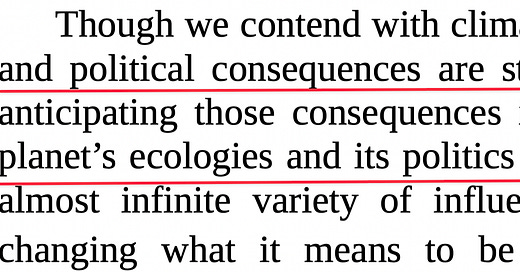Sooner or later - hopefully really soon - we will all have to adjust to a planetary political order. Carbon doesn’t know national or international boundaries, and neither should our politics. But what form will that planetary politics take?
Wainwright and Mann’s answer takes them back to the foundations of the dominant political solution of the modern era - the state. Leviathan is the term coined by Thomas Hobbes to denote “Multitude so united in one Person” to form the “Commonwealth.” ‘Leviathan’ is a biblical term but Hobbes doesn’t use it as a mythical analogy. His speculations are trained upon a future reality, not a monster from the past.
on the basis of which M&W ask:
What will become of sovereign security under conditions of planetary crisis?
Note the use of the term ‘security’ and the conditions that lead to the need for security: crisis, risk, uncertainty. It’s these extreme conditions - this book focuses on climate change, but we can also add financialization, inequality, migration etc as well as non climate signs of ecological collapse- that prompt the new political order. And let’s not forget how the pandemic has made the crisis a lot worse.
The ‘reign of terror’ that started with 9/11 and led to several wars was fake in its inception (remember the infamous Colin Powell ‘evidence’ for WMDs in Iraq) but can now be read as an unconscious flex towards a future security regime. The authoritarian response to climate change is looking more and more attractive and I wouldn’t be surprised if there’s a phase transition in the Republican Party in the US (and also from the Chinese and Indian govts) in which a permanent climate emergency is the basis for an explicitly fascist regime.
One of the constant complaints is that elites the world over - and most especially in the first world - have brushed aside the findings of the scientists. But the assumption is that their class rationality lies in listening to the data. I think that’s happening now, but not to the elite as a whole. One half of the elite is gearing up for the climate leviathan, a global technocratic climate politics that builds upon the capitalist system’s capacity to coordinate large technological shifts and political responses.
But the situation is so bad that the elite aren’t able to coordinate a joint response and instead are beginning to indulge in ‘end of times’ narratives. This wing of the elite may choose to let the crisis unfold before using the chaos as a pretext to create walled gardens around their interests. Pinkerton is selling private security services to the rich preparing for climate collapse.
Whether the Leviathan is liberal or authoritarian, planetary sovereignty is here for good.
Is sovereignty the right concept to generalize to the planet as a whole? M&W hint at another possibility:
Liberal, authoritarian and revolutionary span the spectrum of political responses to anything today. But what is this ‘politics’?
Got it: politics is where social relations are worked out. So what is ‘social’? M&W don’t answer that question, but we can cut and paste a paragraph from Latour’s “Reassembling the Social” to get to the definition of the social:
I like Latour’s definition of social because it doesn’t isolate a special regime called the social which lies over and above other regimes - mental, biological etc. Instead, it’s a type of connection between heterogeneous elements. Which brings me to the definition of planetary in planetary politics:
The planet is not a ‘thing’ which serves as a backdrop against which human politics is conducted - like when researchers use the term ‘don’t cross planetary boundaries’ when talking about human societies. Instead, the planetary is a form of connection, a way in which we are embedded in the world with many other beings. It’s the most expansive form of ‘being-with’ others.
Even better: it’s not planet, but ‘planeting,’ a verb that signifies how we connect one being to another in a planetary kind of way.











